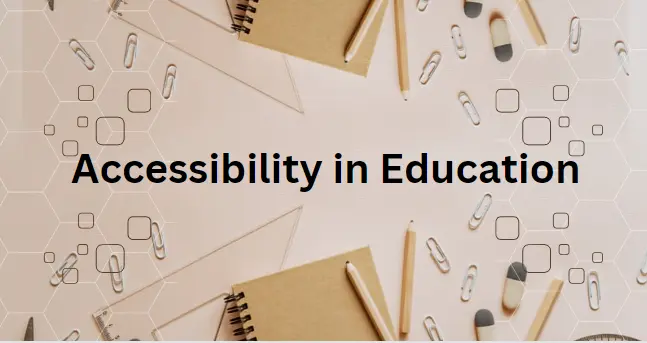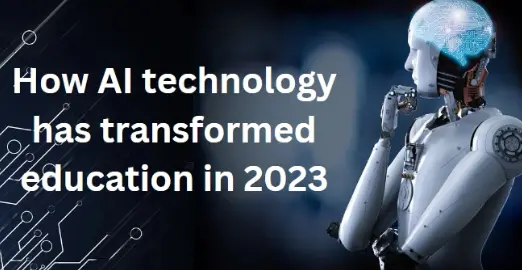Artificial intelligence (AI) is rapidly changing how we work and live, and this is also true of education. As a result of the development of new technology and data-driven tools, AI is revolutionizing how we study, teach, and evaluate student development. AI will become more prevalent in education in 2023. It alters how we approach learning at all grade levels from elementary school to post-secondary education and beyond.
Notably, enrollment in online programs has increased by 170%. Enrollment in open and distance learning (ODL) has increased by 41.7%. It is breaking the previous record for non-traditional enrollment. This article examines how AI technology is revolutionizing education and what that means for the future.
Artificial Intelligence enhance learning
Technology advancements like Artificial Intelligence (AI) significantly improve learning outcomes. It gives hope for the future of education. Virtual teaching assistants and AI-powered chatbots like ChatGPT will offer students individualized feedback. Support to help them meet their academic goals.
The analysis of student data and the dissemination of insights to teachers is one of the most intriguing ways AI will improve learning. This will allow teachers to adapt their teaching strategies to meet the unique needs of each student, improving outcomes for all.
52.1 percent of teachers believe that AI is highly beneficial for their professional development. It allows them to make data-driven decisions and design a more effective and efficient educational system for all students. AI algorithms analyze factors like student engagement and learning styles.
Personalization in Education
An additional era of personalization in education has arrived thanks to AI technology. The way that students are evaluated has changed as a result of adaptive assessments. These tests offer immediate feedback and adjust the difficulty level in accordance with individual progress and knowledge levels.
Adaptive assessments, which cater assessments to each student’s abilities. It guarantees that students are neither overwhelmed nor bored. Resulting in more accurate assessments of their abilities and knowledge due to this.
Customized learning content is another area where AI has made significant strides. AI-generated content caters to diverse learning styles and preferences, delivering materials in various formats such as text, audio, and video.
Personalized curricula based on student interests and goals empower learners to take ownership of their education. AI makes sure that students stay engaged and motivated by catering to individual preferences, which improves learning outcomes.
Moreover, AI-powered virtual assistants provide individualized support to students. These assistants are available on-demand, offering guidance and answering queries in real-time. The learning experience is customized to meet the particular needs of each student.
It is offering personalized recommendations for additional learning resources. The ability of AI to provide tailored interventions, and accommodate their unique challenges. And facilitating their educational journey can be very beneficial to students with specific learning requirements.
Accessibility in Education
AI technology has played a crucial role in making education more accessible to a wider audience. Language translation and localization tools powered by AI have broken down language barriers. It is allowing educational content to be accessed and understood by non-native English speakers. Individuals around the world can benefit from a globalized and inclusive educational experience.

Assistive technologies have also flourished with the integration of AI. Students with disabilities, including those with visual, hearing, or physical impairments, can now access education more easily. AI-enabled tools provide voice recognition and text-to-speech applications, making educational content more accessible.
AI tools like summary generator help to summarize your assignment or any other educational content in a single click. Adaptive interfaces and assistive devices further enhance inclusivity by providing students with the necessary support to engage in their learning journey.
Creating Courses
Artificial Intelligence (AI) has also revolutionized the process of creating courses in education. Professors can bridge the knowledge gap between their lectures and study materials. These software tools help teachers create individualized lessons.
Tailored to the particular requirements and learning preferences of their students. AI can offer helpful insights on how to improve course materials and delivery methods. Allowing professors to improve their teaching strategies. Also, produce a more effective learning environment.
An excellent example of AI-driven course creation can be seen in the platform Coursera. This is a widely recognized provider of online courses. Utilizes AI technology to notify teachers whenever students submit incorrect responses to questions.
Teachers can spot where their students are having difficulty and make the necessary corrections to help them understand. As well, remember more of what they have learned. Professors can improve their instructional materials. Make sure they are interesting, educational, and supportive of successful learning outcomes.
AI-Based Tutors
The concept of having AI-based tutors may still seem like a fantasy. The rapid development of AI technology suggests that it may soon become a reality. Although fully autonomous AI tutors are not widely available. There are already AI-based tutoring tools on the market that provide valuable assistance to students in various subjects. Such as mathematics and basic English.
As AI technology continues to advance, the potential for AI-based tutors to become more sophisticated. AI tutors could potentially simulate human-like interactions. Adapting to each student’s unique learning style and providing tailored instruction. Such AI-based tutors have the potential to greatly enhance individualized learning experiences. It offers personalized support and guidance to students. Regardless of their geographical location or time constraints.
Conclusion
In 2023, AI technology has transformed education in profound ways. It has elevated learning outcomes by employing adaptive learning systems. Also, intelligent tutoring systems, and data-driven insights. Furthermore, efficiency in education has been achieved through automated administrative tasks and predictive analytics. As AI continues to evolve, it holds immense potential to shape the future of education. Empowering learners and educators to thrive in an increasingly dynamic and interconnected world.

